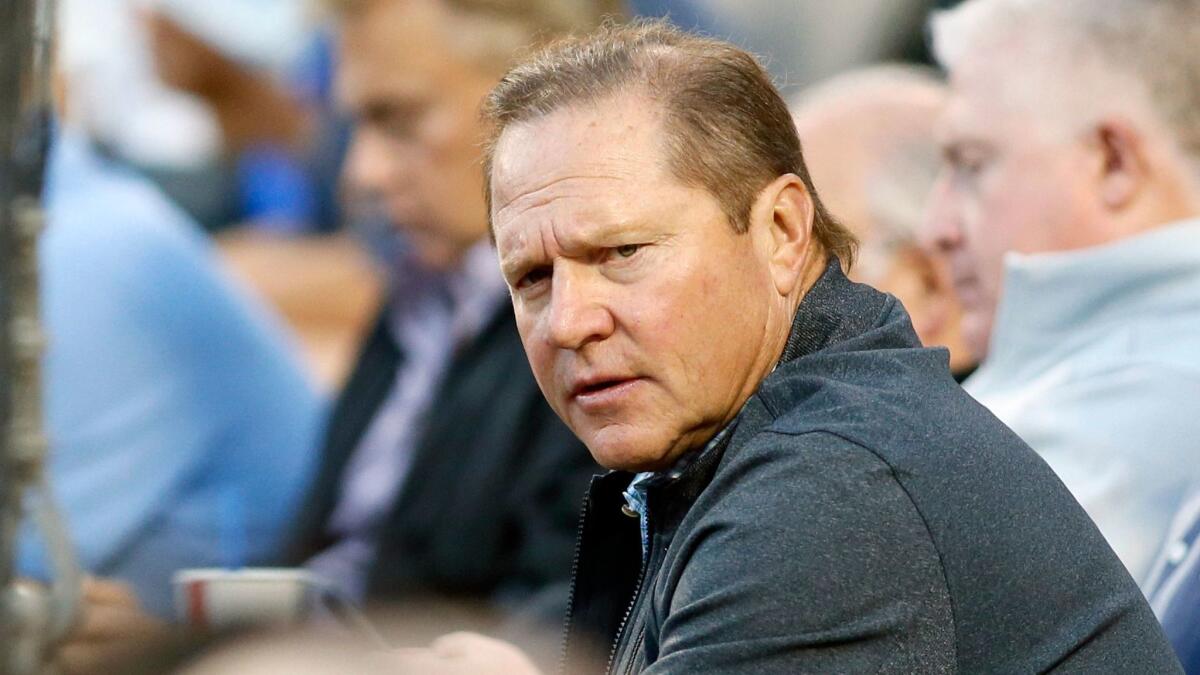Column: MLB players have a long battle ahead. Who’s in charge?

- Share via
The very mention of Scott Boras makes executives in the commissioner’s office cringe.
The vast majority of agents do their work quietly. Boras, on the other hand, is delighted to hijack the All-Star Game, general managers’ meetings and winter meetings every year with colorful rhetoric guaranteed to generate media coverage. And the rollbacks and restrictions on draft bonuses are largely a response to Boras’ skill in persuading owners to pay millions to top picks, even though those players could only negotiate with one team.
So, when Major League Baseball and the players’ union issued dueling statements Tuesday about whom to blame for this winter’s free-agent freeze — the union blamed the rising number of tanking teams, and league blamed agents misreading the market — Boras got under the league’s skin yet again.
The MLB statement noted that “some of the best free agents” had received “substantial offers, some in nine figures.” No players were named in the statement. It has been widely reported that Yu Darvish, Eric Hosmer and J.D. Martinez — the latter two are Boras clients — have such offers.
The collective bargaining agreement forbids the commissioner’s office and the union from making “comments to the media about the value of an unsigned free agent, or about possible or contemplated terms for an unsigned free agent.” In addition, Boras told FanRag Sports, the league essentially was publicly sharing contract offers with all 30 clubs, which could be a significant claim in a potential collusion grievance.
In response, Deputy Commissioner Dan Halem said: “If Mr. Boras spent as much time working on getting his players signed as he does issuing inflammatory and unsubstantiated statements to the press, perhaps the events of this off-season would be different.”
Halem should not have taken the bait. The owners are winning this winter — so much winning! — and all of it under the terms of a collective bargaining agreement ratified by the players.
The players appear angry and confused. Agents have led the way in firing public shots at the owners. After a largely silent winter, union chief Tony Clark has followed the agents in speaking out.
On Tuesday, several players — including Dodgers All-Stars Justin Turner and Alex Wood and former Angels closer Huston Street — took to Twitter, primarily to argue that fans are cheated when so many teams do not sign free agents because they are not trying to win this season.
Dodgers closer Kenley Jansen has floated the possibility of a player strike. Agent Brodie Van Wagenen has floated the possibility of a player boycott of spring training, which Clark publicly shot down.
Here’s the thing: The public pretty much views baseball labor strife as millionaires vs. billionaires, with little sympathy for either side. The players get the worst of it, because they are the faces of the game, and because their salaries — unlike owners’ profits — are public.
The collective bargaining agreement has three years to run after this one. The analytics revolution has so changed how players are valued that the players might want earlier free agency — after four years, say, instead of six. They might want to strip tanking teams of draft picks. They might want to require a minimum payroll for major league teams.
All of those concepts would require significant negotiation, and owners would not grant concessions in those areas unless players granted concessions in others.
These are the questions players ought to ask now: What do the players want to change? What can they realistically hope to change? What is their best strategy for persuading the owners to change?
And one more: Is Clark the right person to lead them?
Clark secured what the players asked of him in the last round of collective bargaining — more creature comforts, more day games before long flights, more days off — but perhaps the players again need a labor lawyer leading the union, rather than a former player.
As Clark conducts his annual tour of spring training camps, players should listen closely to his proposed way forward. Maybe the players believe in him, and they beef up his staff. Maybe they don’t, and they replace him.
Either way, there is not much time to waste. From here, statements and tweets seem like a waste and a diversion from the critical issues only the union can resolve for itself. As the saying goes, keep your eye on the ball.
Follow Bill Shaikin on Twitter @BillShaikin
More to Read
Go beyond the scoreboard
Get the latest on L.A.'s teams in the daily Sports Report newsletter.
You may occasionally receive promotional content from the Los Angeles Times.











